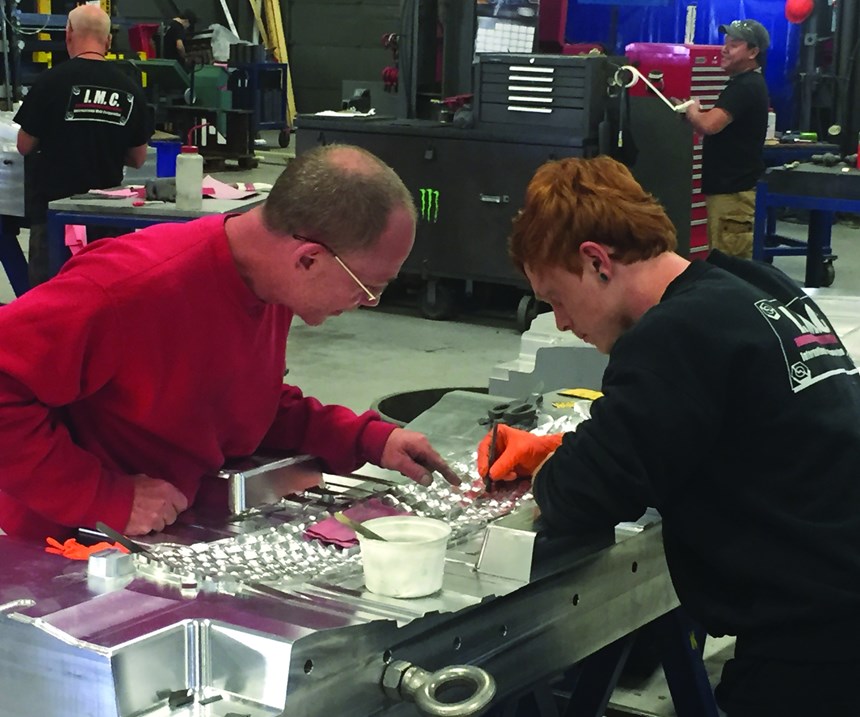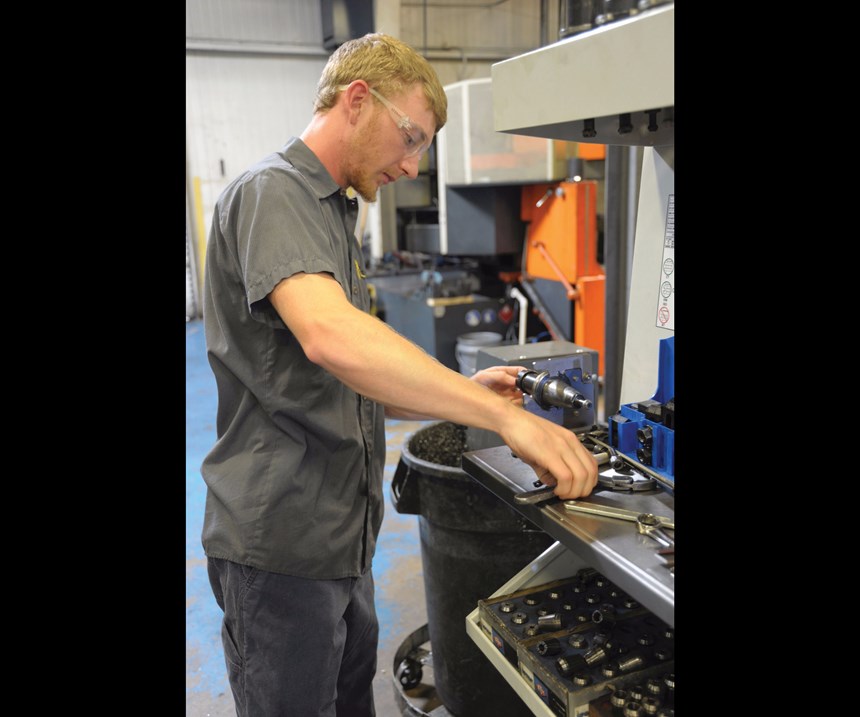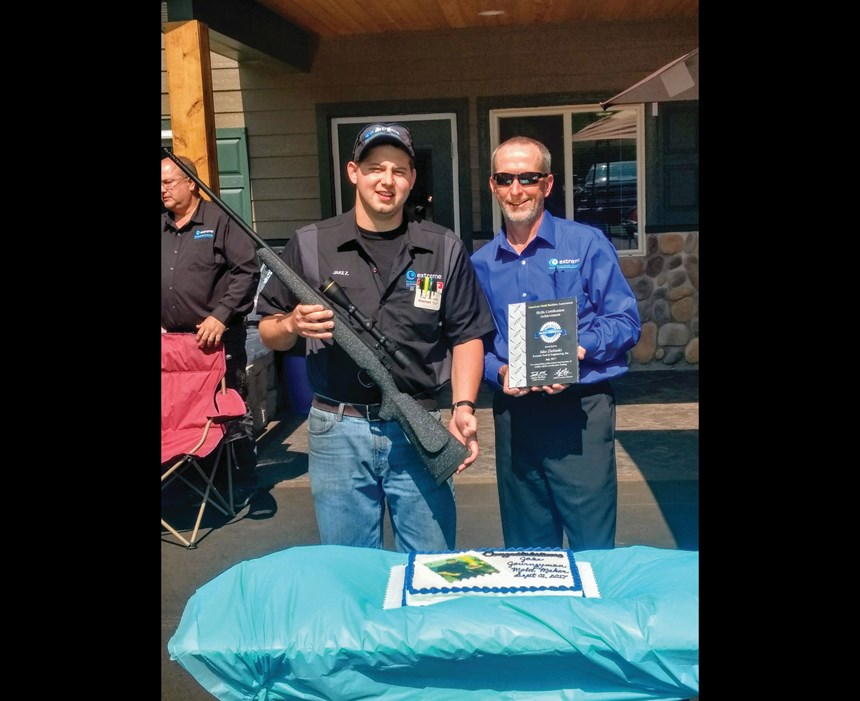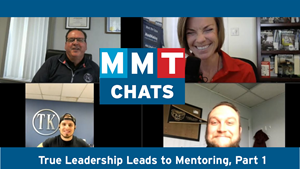Moldmakers Choose Different Pathways to Workforce Development
Mold manufacturing companies share their strategies, the challenges they face and their commitment to training the next generation of makers.
Moldmakers are a passionate group when it comes to what they do. Whether a shop is large or small, high-tech or more traditionally operated, the commitment to finding, training and retaining the next generation of makers is a top priority and one they face with a focused strategy and with fervent purpose. The companies featured here represent the many mold manufacturers and workforce development programs that those mold manufacturers have developed to ensure the industry’s future remains strong and vibrant in North America.
Building a Manufacturing Workforce Pipeline
It takes a collaborative effort at the local level to truly build a pipeline that feeds the manufacturing workforce of the future, and one moldmaking company is doing its part. It is helping to build a real pipeline program, and workers are coming. That organization is Westminster Tool of Plainfield, Connecticut, winner of MoldMaking Technology’s 2014 Leadtime Leader Award.
Acting local is the most efficient way to conquer today’s skilled-workforce dilemma. Think about it—if everyone focused locally, the global problem would essentially solve itself. But, acting locally takes a big effort and a committed champion. For Connecticut, that person is Ray Coombs, owner and president of Westminster Tool. He is a strong advocate of youth in manufacturing and is known for making things happen. Currently, approximately 21 of his 38 employees are under the age of 30, including Kylee Carbone, his director of human development and marketing, who is instrumental in organizing Coombs’s efforts.
Coombs encountered a lack of skilled workers within his own industry and recognized early on that fighting this workforce problem required a unified voice from the community, educators and business owners. He established the Eastern Advance Manufacturing Alliance (EAMA) so that they could tackle the state’s workforce problem together. “There is no individual champion. It is industry,” Coombs says. According to the EAMA website, the group strives “to strengthen the regional advanced manufacturing industry by harnessing the collective energy of regional manufacturers through advocacy, workforce and education development and career awareness.” To date, EAMA is made up of nearly 60 manufacturers across myriad end markets. “It’s not just a manufacturing association. It is embedded into the community,” Coombs says.
The biggest mission of EAMA is the members’ active involvement with the Eastern CT Manufacturing Pipeline Initiative, which feeds the skilled-workforce needs of local manufacturers with just-in-time classroom training, online training options and job search assistance for jobseekers who are unemployed or underemployed. What is key about this program is that the training is designed to fit the specific hiring needs of the manufacturers involved. Alongside EAMA, the Eastern Connecticut Workforce Investment Board (EWIB), state legislators, the U.S. Department of Labor, Three Rivers Community College (TRCC) and Quinebaug Valley Community College (QVCC), General Dynamics Electric Boat and the State Technical High School System all play vital roles in this program.
The foundation of the Pipeline Initiative is that common cause or crusade to deal with the workforce issue directly. However, an essential building block of the Pipeline Initiative is the funding that has made it a reality. The stars aligned for Connecticut a few years ago when a new governor, Dannel Malloy, took office and became committed to prioritizing manufacturing with several initiatives that focus on creating manufacturing centers and subsidizing employment for direct manufacturing employment. Plus, new presidents were hired at both QVCC and TRCC who were open to working together to provide the necessary training. This was on top of a $15 million Technical Assistance Consultancies (TAC) grant from the Connecticut Advanced Manufacturing Initiative (CAMI) and a state appropriation of $70 million for the Connecticut Manufacturing Innovation Fund (CMIF). A portion of the CMIF money is allocated for apprenticeship training, as the state has exploding ship building and aerospace industries.
It takes a collaborative effort on the local level to truly build a pipeline that feeds the manufacturing workforce of the future.
EWIB was critical in getting these grants. As a non-profit agency that oversees a network of workforce-related programs that are funded from a variety of sources, EWIB is comprised of seasoned grant developers. The agency’s private-sector, majority board is made up of representatives from regional businesses, state agencies, organized labor groups and local educational institutions.
The key to the success of the Pipeline Initiative is its multiple “on- and off-ramps” that offer interested workers user-friendly options to enter the manufacturing field regardless of their manufacturing background. So, whether someone is a recent high school graduate, an adult seeking a career change, or a recently dislocated worker, the Pipeline Initiative has available options (and more than 4,000 residents have signed on in the first year).
Basically, EAMA gets a pulse for the hiring and training needs of its members and then the EAMA Board of Directors works with EWIB, community colleges and technical high schools to apply for grants and funding, and steers the manufacturing-related curriculum and training at the high school and college levels. The process involves community colleges developing associate, non-credit and certificate programs that meet the needs of the employers and high schools creating programs that feed into the college-level programs. The technical high schools that participate allow the community colleges to use their space and equipment to offer college-level programs. The state and federal governments also provide funding and support legislation that benefits manufacturers. “We believe this program is producing employees who would be a fit for almost any organization because we are giving them the core manufacturing skills,” Coombs says.
QVCC, for example, is the baseline for Westminster Tool’s in-house Westminster Academy, which offers six-week training programs up to associate degrees. Westminster Academy focuses on both the who and the what of manufacturing in its own 3,000-square-foot space, complete with classrooms and dedicated training machinery. Its program consists of highly structured modules that put tribal knowledge into a teachable format. Employees document their job functions before moving onto another job function, train incoming personnel and provide thorough cross-training. Each module offers a full outline of the skills that specific positions require of workers. The academy also includes 10 “soft skills” modules. Today, the Eastern CT Manufacturing Pipeline Initiative program has a 94-percent placement rate.
Bringing in an Apprenticeship Skills Expert
International Mold Corp. (IMC) is based out of Clinton Township, Michigan, and has 19 apprentices, most of whom were recruited by word of mouth. “A lot of our young people come from friends and families of employees,” Gabe Meldrum, plant manager, says. “I feel that says a lot about our company. If our journeymen feel comfortable bringing them in, that means they believe moldmaking could be a great career for the apprentices, and it is.” The company established its current apprenticeship program in 2013. “It’s not a typical in-house program. We partner with Praeco Skills LLC out of Rockford, Michigan, to teach younger apprentices the basic, core skills that they need to be safe and successful in a shop environment,” Meldrum says. Specifically, IMC uses Praeco Skills’ 24-week, comprehensive PS4000 Machining Industry Essentials course, which uses a combination of instruction methods to teach apprentices essential skills that every precision machinist must master. For example, apprentices learn the language of measurement and how to speak and read the numbers correctly.
IMC apprenticeship candidates do not immediately begin the Praeco training program, however. Typically, an apprentice will get hired as a part trimmer, a truck driver or a saw man. “Once we see potential, we start with the Praeco Skills program, during which we can evaluate the apprentice’s strengths and assign a position that will best utilize the talent and aptitude of the apprentice. Once we determine that, we advance the apprentice with concurrent mentorship and cross training, which entails working with mentors on the shop floor to learn manual machines,” Meldrum says. He adds that one of his first and very best apprentices is already mentoring new apprentices alongside seasoned IMC department leaders. Andrew Mueller works as a CNC programmer and machinist. Regarding his experience, he says, “IMC and Praeco Skills have given me an education in many areas of moldmaking, which makes me more efficient and productive so I can perform at a higher level.”
It’s not a typical in-house program.
IMC may also arrange supplemental training to further advance apprentices’ skills. For example, apprentice moldmakers attend Cimatron Viewer training. IMC has computers on the floor in all five of its mold shops, so designs are available to help answer any questions that budding moldmakers may have. CNC machinist apprentices go through the advanced CNC training classes at the Michigan location of the machine-tool sales and service provider Single Source Technologies (SST), and then they attend toolpath software training using software from Vero Software (WorkNC), Tebis America Inc. or Lemoine Technologies, depending on the machines that the apprentices will run as machinists. Meldrum says they sometimes enroll in classes that WardJet offers to learn the proper use of waterjet machines as well, since the company uses a waterjet for ejector plate and manifold work.
The Praeco Skills program includes live webinars with direct instructor contact combined with independent online assignments and skills-check sheets for learning on IMC’s shop floor. Praeco Skills provides more than 200 hours of instruction. Topics cover shop safety (on forklifts, machine tools, materials handling, overhead cranes and more), print reading, basic machining, math (calculating feeds and speeds, using the English and Metric systems, working with angles and more), CNC, precision measurement (tolerances, micrometers, calipers, part layout and more) and attitude (defining work ethic, strategizing time management, creating a culture of pride in work and more).
“Our apprentices meet once a week from 5 p.m. to 8 p.m. in a conference room where they use GoToMeeting to attend classes with the instructor, Ryan Pohl, who is the founder of Praeco Skills,” Meldrum says. “We pay the apprentices for this time. In addition to this weekly class, there is a great deal of online homework for which we provide materials. They are responsible for completing it on their own time.” For example, the students must engrave their initials on a virtual CNC machine. The code is handwritten and then uploaded into the virtual machine. Meldrum says that any mistakes to the code will “crash” the machine, giving apprentices the opportunity to troubleshoot the code and learn how to fix it instead of crashing a real machine. “Praeco Skills also provides them with an account at technical learning systems provider Amatrol, which offers hundreds of interactive courses in CNC, advanced manufacturing, mechatronics and more that the students are assigned to complete.”
Recruiting Early with Competency-Based, Accredited Training
United Tool & Mold Inc. (UTM) is based out of Easley, South Carolina. The group does not build molds. Rather, it specializes in providing engineering changes and repair services for molds, so having employees who know moldmaking is essential. The company has 74 employees, seven of whom are currently apprentices.
UTM offers two adult apprenticeship programs and a youth apprenticeship program. The youth-focused program is called the UTM School-to-Registered-Apprenticeship (UTM STRA) and is offered to high school juniors and seniors who have completed a set of prerequisite courses at local technical high school career centers. Seniors attend classes daily at the colleges after spending their mornings in class at high school. After six weeks, seniors can then go to work every afternoon at a sponsoring company, like UTM, to gain practical experience as well as earn a paycheck. Attendance and progress reports are completed without fail. UTM’s adult programs include the CNC Programmer/Operator apprenticeship and the Tool Repairman apprenticeship. They are a continuation of the youth program or can be a starting point for a qualified apprentice when he or she has reached at least 18 years of age.
“All three of our apprenticeship programs are accredited by the U.S. Department of Labor,” Jeromy Arnett, production administration manager, says. UTM, with Arnett leading the effort, worked with Apprenticeship Carolina, a division of the South Carolina Technical College System, to develop a syllabus of the basic machining and tooling classes for apprentices to take. The more moldmaking-specific training is conducted in-house at UTM. Apprenticeship Carolina also assisted UTM in forming partnerships with Tri-County Technical College and Greenville Technical College. UTM formally launched the apprenticeships in 2010.
As technically driven as these kids are today, we have to challenge them on a daily basis to learn something new, not just complete a task.
Arnett stresses that while accredited, UTM’s apprenticeship programs are more competency-based than hours-based, and skills taught focus on how to do jobs that the company handles daily, like troubleshooting, spotting, welding, polishing and hot runner repair. For example, the industry typically expects that apprentices need to run a lathe for at least 400 hours before they will have the competency to use one efficiently. “They could run it that long and still not be efficient,” Arnett says. “Then again, they could run it for 200 hours and be efficient, so why would we waste that extra time on the lathe when they could be learning something else? As technically driven as these kids are today, we have to challenge them on a daily basis to learn something new, not just complete a task.”
Senior-level mentors provide training, but UTM also invites vendors like UltraPolishing, Inc., MoldTrax and Synventive Molding Solutions to help with instruction. UTM asked its employees to come up with 14 to 16 core competencies on which to train. The list includes using lathes and manual mills, but he says students are learning things the old-school way in repair because nothing is being made from scratch. “They’re working with their hands and using well-known, required techniques like how to reverse engineer an older mold that doesn’t have any data,” Arnett says. “In a digital age, that’s where the value of veteran employees comes in because they have been down that road many times. They can show younger workers how to do it when data isn’t readily available.”
Arnett says it is important to note that UTM does not take applicants off the street anymore, choosing instead to send a team to interview potential apprentices at the high school career centers where they can observe how candidates behave in a shop setting and get a sense of their soft skills. “When we go into the interviews, the young people struggle. They do not know how to communicate, or they are scared or do not know what to say,” he says. “I bet if we conducted these interviews via text we’d probably get a better overall result because that’s how they communicate.” Putting a focus on younger students helps UTM cultivate the kind of employee they want to hire. “We can show them we are willing to invest in their future. We like to tell them, ‘We’re not giving you a job. We’re giving you a pathway toward a career.’”
Training a Master Moldmaker Using Skills Certification Program
On September 1, 2017, Extreme Tool and Engineering of Wakefield, Michigan, notched a company “first” during a congratulatory picnic. Warmed by bright sunshine and holding plates filled with juicy pulled pork that Lead-Moldmaker and chef Andy Laurin smoked, the entire Extreme team presented Jake Zielinski of Bessemer, Michigan, with his American Mold Builders Association (AMBA) Master Moldmaker certification. This certification removed “apprentice” from Jake’s title and replaced it with “master.” It was a simple title change that signified Jake’s achievement, but it did not happen overnight and was not Jake’s original career path choice.
Jake began working at Extreme Tool when he was 16 as a general laborer who performed odd jobs such as injection molding press operation and janitorial work. After high school, Jake chased a four-year degree in mechanical engineering because it was touted as the best path to personal and professional success. Early in his sophomore year, Jake returned to Extreme in a new capacity as a mechanical engineer intern, planting him squarely in the company’s finishing department. “I would work for three to four hours in the shop, early in the morning, and then I would have to leave to go to class. I hated leaving work!” Jake says. He fell in love with the moldmaking profession, but this realization caused some personal turmoil because of the stigma of giving up a four-year college degree. Entering the workforce as an apprentice would only result in a certification.
Jake began asking the journeymen moldmakers he was supporting how they reached such a high level of precision-manufacturing prowess. The journeymen explained that they obtained their certification through apprenticeship programs. Jake approached the senior leadership at Extreme to see if they would invest in him by providing an apprenticeship program. Having employed Jake for several years already, Extreme jumped at the chance to secure such a bright young man within their workforce and agreed to provide training. Extreme then turned to the AMBA’s Skills Certification Program.
Doug Hippe, program manager and director of Continuous Improvement, served on the AMBA Developing a Curriculum committee (DACUM) that established the Primary Skills, Master Moldmaker and CNC Tech certification programs for the AMBA. “We wanted our apprenticeship to reflect the skills defined in the AMBA curriculum, so we know our apprentices have the training and skills that they need to be successful moldmakers,” he says. “We started by using the AMBA curriculum as the structure for a formal U.S. Department of Labor injection-moldmaker apprenticeship program.” Extreme then tailored 10 to 15 hours per week of moldmaking and machining courses that Praeco Skills provided online at the end of the work day. In addition, Extreme provided 8,000 hours of targeted, on-the-job training in the shop, including a year operating manual and CNC mills and lathes, learning to rough, hard-mill and hard-turn mold components. Other hands-on learning included operating and programming wire and sinker EDMs, designing electrodes, polishing components and learning how to set up and run molds in the company’s molding facility. Jake spent the final year just working in the finishing and grinding department.
Throughout the near four-year period, Jake participated in routine assessments and had to meet performance benchmarks before he could move on to the next phase of training. “We used the AMBA’s certification exams for Primary Skills and Master Moldmaker as our ‘final exam’ and proof that our apprentice understands the concepts and has the skill sets needed to be a journeyman.”
Jake is the first graduating apprentice to achieve Master Moldmaker certification from Extreme Tool and Engineering. To commemorate Jake’s accomplishment, Mike Zacharias, president and owner of Extreme, gave Jake a custom Nosler .338 Win Mag rifle featuring a Kevlar stock, saying that the rifle, like Jake, will never give up. Zacharias closed the celebration by saying, “Going first is never easy, but not only has Jake completed the initial segment of a lifelong journey, he’s played an active role in creating a path for others to follow. From this day on and for every day after, Jake can be proud to say he was Extreme’s first!”
Related Content
The Role of Social Media in Manufacturing
Charles Daniels CFO of Wepco Plastics shares insights on the role of social media in manufacturing, how to improve the “business” side of a small mold shop and continually developing culture.
Read MoreExploring ISO 9000 - Part 16 Control of Quality Records
A Series of International Standards for Quality Management and Quality Assurance. We begin 2022 with a review of Clause 4.16 Control of Quality Records.
Read MoreWhat is Scientific Maintenance? Part 2
Part two of this three-part series explains specific data that toolrooms must collect, analyze and use to truly advance to a scientific maintenance culture where you can measure real data and drive decisions.
Read MoreICYMI: MMT Chats: True Leadership Leads to Mentoring, Part 1
This trio from TK Mold and Engineering in Romeo, Michigan, joins me to discuss the role of leadership and culture in mentorship. This episode is brought to you by ISCAR with New Ideas for Machining Intelligently.
Read MoreRead Next
How to Use Strategic Planning Tools, Data to Manage the Human Side of Business
Q&A with Marion Wells, MMT EAB member and founder of Human Asset Management.
Read MoreAre You a Moldmaker Considering 3D Printing? Consider the 3D Printing Workshop at NPE2024
Presentations will cover 3D printing for mold tooling, material innovation, product development, bridge production and full-scale, high-volume additive manufacturing.
Read MoreHow to Use Continuing Education to Remain Competitive in Moldmaking
Continued training helps moldmakers make tooling decisions and properly use the latest cutting tool to efficiently machine high-quality molds.
Read More_970x90 1.png;maxWidth=970;quality=90)

























.jpg;maxWidth=300;quality=90)







